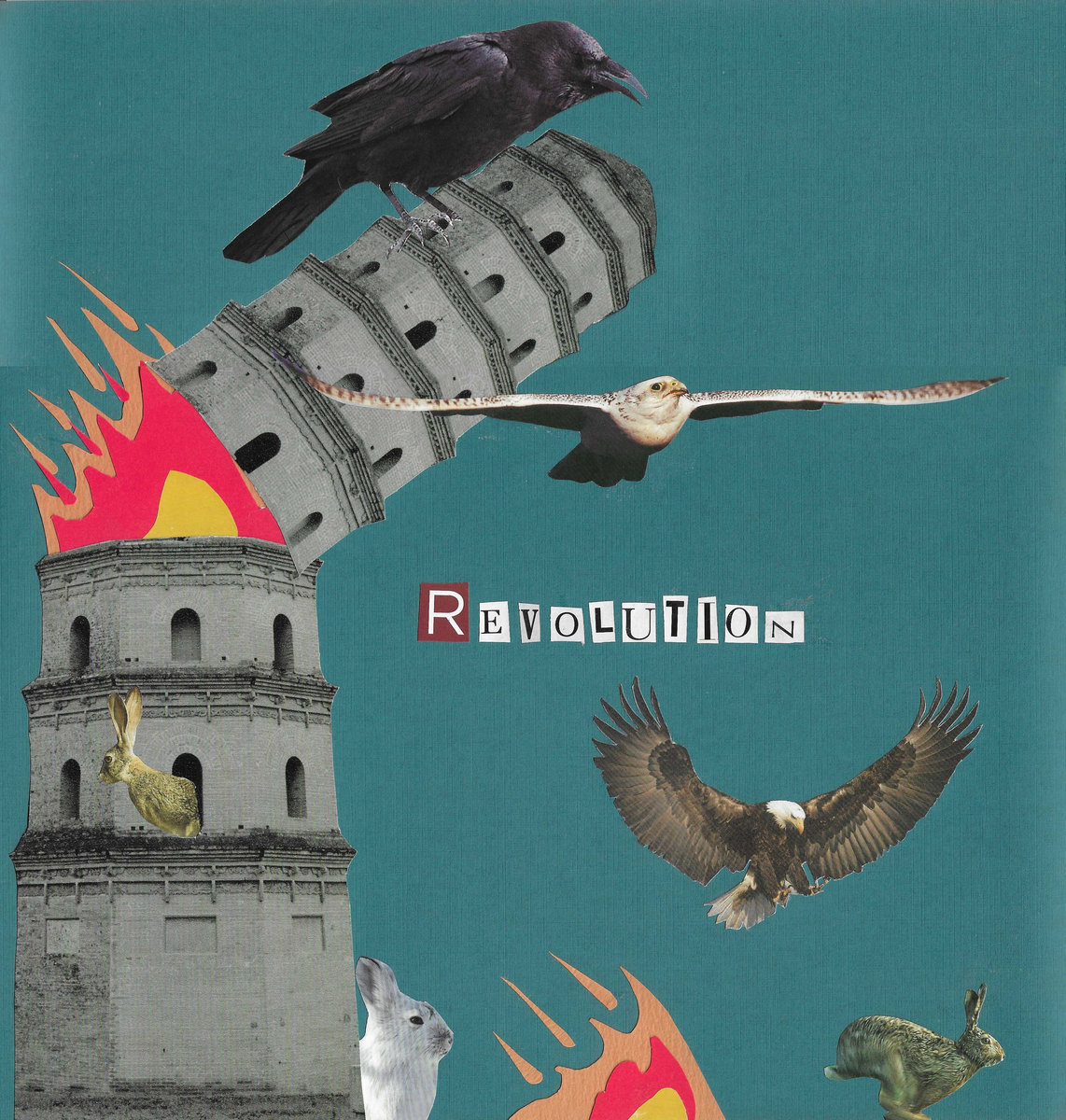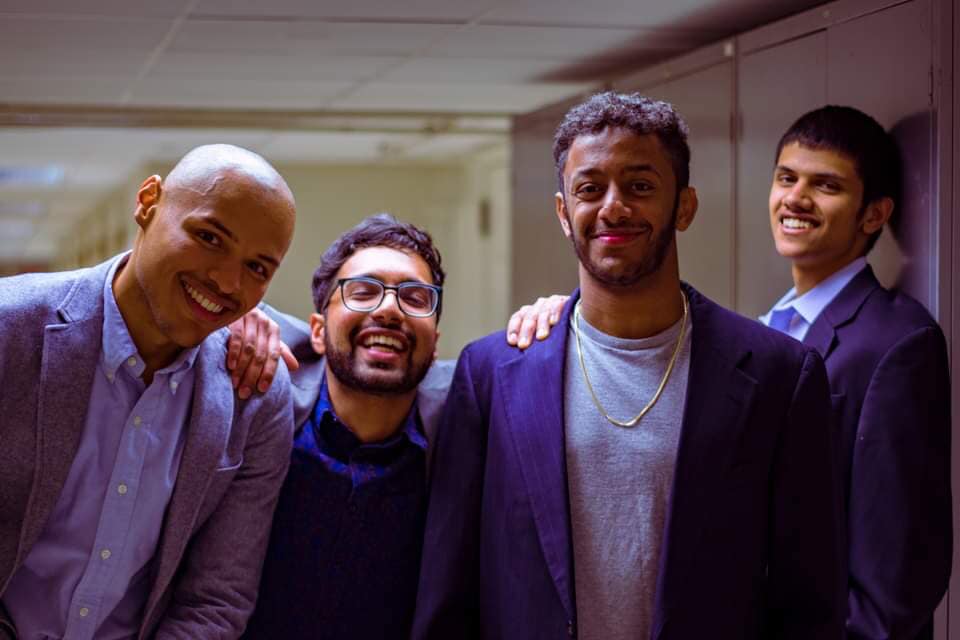Luckily for The Data Waves, they began writing the music for their debut album more than a year before the COVID-19 pandemic hit. Dazzling with their jazzy, instrumental funk, the group has played a lot of local shows, rocking just about every Urbana basement with their house shows over the last two years.
Every bit of the band’s radiant, layered energy shines through on Revolution, a listen that invigorates as much as it allows for inward reflection. Made up by Kevin King on the saxophone and flute, Sammy Gessessee on guitar, Shravan Raghuram on drums, Aditya Kashyap on bass and Joey Parker on the keyboard and synthesizer, they’ve had the album in the works for two years as they explored their natural sound and capabilities.
They released three studio EP’s and a live EP over the last two years, too, and in that time, honed their talents and are constructing a vibrant catalogue. It feels odd to call a group’s first album a “coming-of-age” project, but there’s a different thoroughness on Revolution than on Lilac or Lady In Red (which has a superb flip of Curtis Mayfield’s “Move On Up”, by the way).
After a hard, long year, Revolution is a celebration of life, the persistence of the human spirit and a rededication to coming together.
“This is the kind of record that you put on when you’re at night by yourself, and really get into,” Kashyap said. “That was our goal for this, and it seems like people are actually doing that and listening to it and appreciating it while they’re just at home.”
“Shade in the Evening” is a reflection on melancholy that has been hard to shake, but starts turning into something less dark and more driven than somber. Parker’s subdued synths lay the path for a soothing saxophone and guitar interplay on a track that sets the standard for an eclectic, layered product that grows wings.
Unlike the bands earlier projects, Revolution isn’t an assortment of jam sessions that were collected, defined, and polished. Rather, it’s the brainchild of being forced to collaborate from a distance, pieced together layer by layer rather than recorded in one or two takes.
“How we recorded most of our [original] stuff was in a live room setting,” Raghuram said. “We’d all set up together, and we’d have a big ol’ interface where everything’s plugged in so we can track everything at the same time. We kind of had a different approach with this one, we focused more on multitracking.”
Working on the project before COVID-19, there was already an emphasis by the group on adding new dimensions and a more polished sound to their arsenal. They enlisted Allen Xu, aka yourbeautifulruin (who has also collaborated with CJ Run), to mix and master this project. Once the pandemic did hit, together Xu and the band divvied up the work, piece-by-piece, while being in various locations throughout the state. Xu’s now based in Minneapolis.
This forged an even stronger trust amongst one another, creating more appreciation for what each collaborator brought to the table.
“It was kind of like individuals taking more leadership and having more control,” Kashyap explained. “We would send the files to someone like Shravan to record drums, and he would have any amount of time that he would choose to record the drums for that. Same with me, I mean, I had the files on my computer for a long time. So, if I thought of new parts to add, I had the liberty to just add that, and the guys, we all trust each other. So if one of us is going to make a creative decision that they feel is right, then we’re gonna put our trust in them.”
Gessessee said it was a lot different than the group’s usual creative process, which is typically very free flowing and even unscripted in live sessions.
“We were all just having fun when we’re writing our songs,” he said. “When you’re playing live shows and listening to some of those tracks, even now when we had to put them together in a studio type of format, it was lot different for us. We’re used to just jamming just having fun with the music.”
“When we had to kind of sit down and get serious with it and really just put everything together,” he continued, “it told a little bit different of a story.”
Written by Gessessee, Revolution‘s title track incorporates an influence from reggae music and the way it inspired rebels, generations of political activists and reformers. As the track progresses toward its climax, King enters with defiant melody that cuts through and directs the rising tension.
The album acts as a guide in troubled times, weaving a sonic scape that spans gloominess, anxiety, and frustration before manifesting hope, determination, and passion. We spoke about how their instrumental style reaches people differently than music with vocals. King and Kashyap enjoy seeing what the project makes others feel.
“It feels different for every single person,” King said. “I might have a different feeling when I listen to ‘Raven’ or a certain feeling when I’m listening to ‘Revolution’, but my feeling doesn’t reflect everybody else’s feeling.”
One of the first tracks written and recorded for the project, “Raven” is the sound of flight, and in Raghuram’s words, it is “our transportation to a new beginning; a new future” as Revolution concludes. King’s saxophone play punctuates the guitar and bass rhythms, and the song peaks with a stunning solo that rolls intocascading drums before looping back into a harmonious landing that closes the project.

Artwork by Matthew Lesniak.
“That’s what I think I love about instrumentalists the most,” King continued. “We we might not be able to directly say, ‘I hate you,’ right, but I feel like that gives more room for interpretation, which allows every person to feel like they’re involved in music and involved in the project, which is something that’s not as easy to do with music.”
A personal favorite, “Best Left Unopened”, feels like what you’d listen to on your walk home from acing a final you spent the entire night before cramming for. Inspired guitar and saxophone melodies lay the groundwork for a progression into an upbeat harmony that tells a tale of perseverance and progression.
Unable to play live shows except in a virtual format, the band’s showcases how it is more open about the meaning and themes of their work; Raghuram has been sharing tidbits about the tracks on their Instagram.
“Those people who have been involved with us in-person, those who would always go to the shows, are inclined to share our stuff online and show other people, message them instead of telling them at a party or something,” Raghuram said. “We’ve just been trying to build our base organically around that, but it just so happens that it has to happen completely virtually rather than in-person.”
The group just headlined Punch Line Productions’ Minecraft festival (yes, you read that right) during the first week of December, and plans to continue to look for opportunities to share their work as the pandemic wears on. In the meantime, they hope that more and more people are able to connect with their music and the messages they’ve put into it.
Kashyap thinks the album has been molded by the time and spirit of the days in which it was made, taking its final shape after months of careful layering and editing.
“It’s always good to reflect on the context in which the songs are written, and no better context for a song like “Revolution” than what we’re experiencing right now,” Kashyap said. “I mean, Revolution has been a long time coming, but no better time to acknowledge it than right now. So I think that may be the biggest message, we’ve got with this record.”
“We put in this much work, and we were able to do it at a time when things are especially tough,” Kashyap said. “To see people respond to it positively, and have it remind them of better times, and possibly a better future that is yet to come. That’s what we’re hoping for.”








